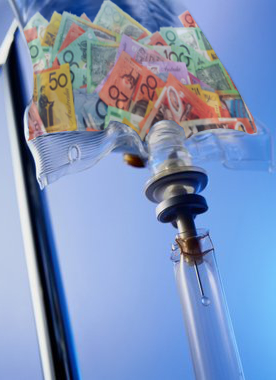Research the redeeming part of co-payment backflip
 The Prime Minister says the Government has “very, very significantly improved” its GP co-payment plan, by reducing the amount and shunting responsibility for collecting it onto GPs.
The Prime Minister says the Government has “very, very significantly improved” its GP co-payment plan, by reducing the amount and shunting responsibility for collecting it onto GPs.
“The Government is turning GPs into its bagmen for the death of universal health care,” claimed the Consumer Health Forum after the revised policy was announced this week.
“Our GPs are being forced to do the dirty work of the Government,” the president of the Public Health Association of Australia, Heather Yeatman, said.
“Either they lose $3 billion from their own pockets over the next three and a half years or drag it from the wallets of the bulk of their patients.”
The Australian Medical Association has welcomed exemptions for vulnerable patients, as well as pathology and diagnostic imaging, but says the co-payment still stings.
“At a time when general practice is in need of significant new investment to cope with an ageing population and more people with chronic disease, today’s announcement represents a disinvestment in quality general practice,” AMA president Brian Owler said.
The changes will see the Medicare rebate paid to doctors for some consultations reduced by $5 from July 1, 2015.
Because Medicare will chip in less, and doctors have businesses to run, it is expected that they will now get that $5 from patients.
Incentives to encourage bulk-billing of concession holders and children under 16 will remain.
The Government is seeking to change standard GP consultations by offering the same rebate for six-minute consultation as 19-minute consultation.
In addition, Medicare fees will be frozen until 2018.
All of this is aimed at saving the Federal Government some money, while also contributing $3 billion in the first five years to the Medical Research Future Fund.
For many, the research aspect is the only shining light in the policy.
To campaign for the fund, Research Australia recently launched the Medical Research Future Fund (MRFF) Action Group.
It includes members form organisations right across Australia’s health and medical research community, and has described the reformed policy as “a crucial step to overcoming the current deadlock”, and setting up the $20 billion bank.
“It is imperative that the MRFF goes ahead to benefit the future health of Australians and the Australian economy,” MRFF Action Group Chair Peter Scott said.
“It is also imperative the MRFF reaches its full capitalisation of $20 billion in order for an additional $1 billion in funding per year to be delivered to health and medical research in Australia, and to bring us back in line with comparable nations in terms of investment in the sector relative to the size of our economy.
“Health and medical research delivers not only improved life expectancy and quality of life to Australians, it also delivers financial returns to our nation.
“The medicines and health technology industries employ many thousands of Australians and generates billions of dollars of export revenue, which will increase with further investment in health and medical research.
“It also enables us to deliver effective healthcare solutions to our ageing population in a way that minimises inefficiency and wastage.
“Studies show that hospitals and clinics engaged in active research provide more effective healthcare, have access to pioneering clinical trials, and attract the best and brightest, pioneering health professionals.
“The MRFF will enable more research to occur where it needs to happen,” Mr Scott said.
Many politicians remain less than convinced, with independent senator Nick Xenophon saying the Government was “declaring war on GPs”.
Liberal senator Ian Macdonald – who had threatened to cross the floor on the measure – said; “It is a sign of real leadership when a Prime Minister can acknowledge mistakes and take decisive action to correct them”.








 Print
Print